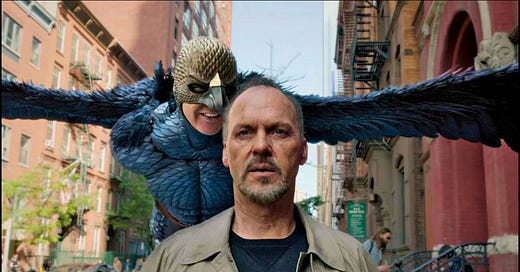On "Birdman" or (The People Who Burn, Burn, Burn)
On the meteoric ascent and inevitable crash-and-burn of the tragic hero, from Achilles through Nietzsche to Birdman.
"The only people for me are the mad ones ... who never yawn or say a commonplace thing, but burn, burn, burn ..."
~ Jack Kerouac, On the Road
1.
To transcend, to rise above, begin by looking up: We all find ourselves lowly, earthbound, “in the gutter” to borrow from Oscar Wilde, but we can set our sights on something higher – we can look up to the stars. There in the heavens is where we find, in director Alejandro Iñárritu’s Birdman, the first of two images: a fiery comet blazing a path through the sky.
Look up for too long, however, and you risk being blinded by the brilliance of what you see. Come too close to that flame and you will burn up and crash back to the lowest place like Icarus after the fall. Down here, we are left with the other of Birdman’s opening images, the washed-up jellyfish laid out on a flat beach, picked at by scavenging birds.
Then we enter, suddenly, the visual stream-of-consciousness that is Birdman’s central narrative, as comic as its opening images are tragic. A…
Keep reading with a 7-day free trial
Subscribe to Volumes. to keep reading this post and get 7 days of free access to the full post archives.





